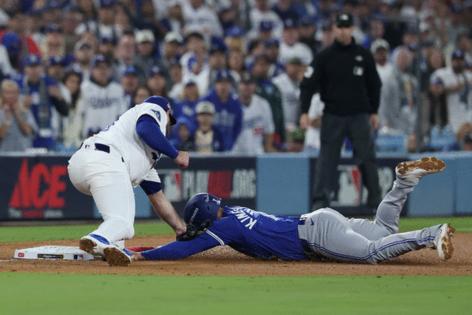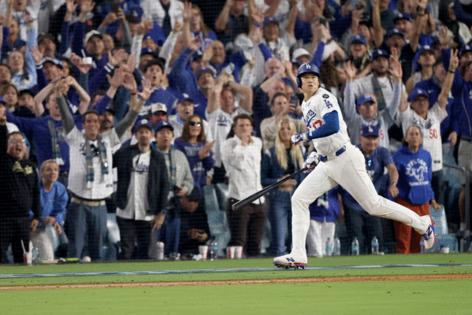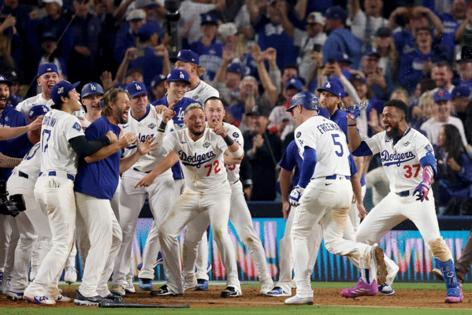Freddie Freeman is Dodgers' World Series walk-off hero again in 18-inning marathon win
Published in Baseball
LOS ANGELES — In the twilight hours of the early evening, before one of baseball's most remarkable nights transformed from relatively normal to patently absurd, Dodgers manager Dave Roberts thought he knew where Game 3 of the World Series was heading.
"Ultimately," he said during an in-game interview with the Fox television broadcast, "it's gonna be a battle of the bullpens tonight."
Turned out, it would escalate into an 18-inning war.
In a game that tested mental mettle, physical stamina, emotional composure and the most extreme limits of both teams' bullpens, the Dodgers and Toronto Blue Jays tied a record for the longest World Series game ever played on Monday night.
Eighteen innings, in six hours and 39 minutes, featuring a never-ending marathon of unfathomable plot twists and narrative-shaping turns.
"One of the greatest World Series games of all time," Roberts said.
"I think we're all emotionally and mentally drained," first baseman Freddie Freeman added.
In the end, it was Freeman who walked it off, hitting a home run in the bottom of the 18th inning — 11 innings removed from the game's previously scored run — to finally break the deadlock and lift the Dodgers to a 6-5 victory and a 2-1 lead in the series.
But unlike last year, when Freeman hit his iconic walk-off grand slam in Game 1 of the World Series, Monday night's swing brought more relief than exaltation.
As Freeman said himself afterward, there were bigger heroes behind this grueling Dodgers win.
"It took every single guy tonight," Freeman said. "I think that just shows you who we are as a group."
Between the two teams, the game featured 19 different pitchers, 25 different position players, 609 combined pitches thrown and 153 separate trips to the plate.
There were sudden shifts and crazy bounces, like when a down-the-line single from Bo Bichette in the seventh ricocheted off a sound technician along the elbow of the wall in foul territory to help the Blue Jays score a go-ahead run.
There were big swings and even bigger stat lines, none more so than what Shohei Ohtani produced in a record-setting 4-for-4, five-walk, five-RBI display, which featured two home runs (including a solo blast in the seventh to tie the score 5-5), four extra-base hits (tying a World Series record) and four consecutive intentional walks in extra innings (when the Blue Jays simply decided they wouldn't let him beat them).
There were game-saving defensive plays, most notably when a Dodgers defense that had committed two errors earlier in the night cut down a runner at home plate in the top of the 10th, after two perfectly executed throws from Teoscar Hernández and Tommy Edman.
And then there were the heroic relief outings, from the scoreless appearances the Dodgers got from youngsters Justin Wrobleski, Roki Sasaki, Emmet Sheehan and Edgardo Henriquez, to the bases-loaded jam future Hall of Famer Clayton Kershaw escaped in the 12th, to the gutsy four innings that Will Klein provided at the end most of all.
"That was kind of the definition of a team effort tonight," shortstop Mookie Betts said. "You don't win World Series or win games with one person. It's going to take everyone. This is a prime example."
That much was clear in the postgame celebration, in which Freeman was hardly even the center of attention.
Instead, after briefly mobbing him at the plate, most of the team quickly gathered around Klein — the 25-year-old, once-little-known trade acquisition who spent most of this season in the minors and hadn't been on any postseason roster before this round.
"I don't know how many times you see a guy hit a walk-off home run, and the whole team is jumping around the pitcher," third baseman Max Muncy joked. "But he deserved it."
"That was so cool," Klein added. "I never dreamed that anything like this would happen."
When Klein entered the game in the 15th inning, he was the last available reliever in the bullpen.
He then proceeded to throw 72 pitches (nearly double his previous season high), give up just one hit over his four scoreless innings, and escape a jam created by two walks and a wild pitch in the top of the 18th by snapping off a curveball for a strikeout to retire the side.
"In the postseason, people talk about the superstars, but a lot of times it's these unsung heroes that you just can't expect," Roberts said. "Tonight was Will Klein's night."
Elsewhere in the celebration, Ohtani and Sasaki ran toward the outfield to greet Yoshinobu Yamamoto — who had gone to the bullpen to begin warming up if needed.
Before then, Roberts was grappling with a difficult decision. With the game dragging on, and Klein's pitch count continuing to rise, he told the Fox broadcast that, if the contest reached the 18th inning, he would turn to a position player to finish the game pitching.
That would have assuredly cost the Dodgers any chance of winning. But it also would have preserved their rotation arms for the rest of the series.
Yamamoto, however, had other ideas, volunteering to throw just two days removed from his complete game in Game 2. Suddenly, knowing there was another option behind Klein to turn to, Roberts decided to send him back for one more inning of work.
"Sometimes that's what you need to win a World Series," Kershaw said. "And we've got a lot of guys in here willing to sacrifice to do that."
Kershaw played his own leading role in the 12th inning, when he inherited a bases-loaded, two-out jam that represented the Blue Jays' best chance to break through in extras.
As the 18-year veteran entered the game, a nervous tension seemed to fall across the Dodger Stadium crowd. They knew, with Kershaw set for retirement this offseason, it could be the final pitching appearance of his career. They feared, it felt, like it might end with another October disappointment.
This time, however, Kershaw delivered, adding one more (and perhaps last) highlight to his illustrious Coopertown-bound career by getting Nathan Lukes to ground out.
"It's a lot of fun to have success when you know you're close [to the end]," said Kershaw, who celebrated the moment with a fist pump while his wife, Ellen, fought back tears in the stands. "So it was a lot of fun tonight, and really fun to win the game at the end. And I got four more times to try to get ready [to pitch in this series]. That's a good feeling too."
All of those contributions almost overshadowed Ohtani's effectively flawless hitting performance.
Way back at the start of the night, he led off with a double against Max Scherzer, then homered his next time up in the third, giving the Dodgers an early 2-0 lead after Hernández went deep an inning prior.
The Blue Jays would storm back, jumping to a 4-2 lead by scoring four runs off Tyler Glasnow in the fourth (three of them coming on Alejandro Kirk's go-ahead blast). But, Ohtani made sure the Dodgers weren't behind for long, driving an RBI double into the opposite-field gap in the fifth before scoring the tying run on an RBI single from Freeman.
The Dodgers were trailing again the next time Ohtani came up, after the Bichette line drive that hit the sound guy in foul territory ricocheted away from where Hernández was initially running in right field, and took long enough for him to retrieve that Vladimir Guerrero Jr. could score all the way from first (with the help of Hernández's errant throw).
But, once again, Ohtani erased the deficit, getting a center-cut, first-pitch fastball from Blue Jays reliever Seranthony Domínguez and blasting it to the left-field pavilion. It was his eighth home run of the postseason, tying Corey Seager's franchise record from 2020.
Ohtani, who is the Dodgers' scheduled pitcher for Game 4 on Tuesday, wouldn't get a pitch to hit the rest of the night. In each of his next four trips to the plate, the Blue Jays intentionally walked him. In the 17th inning, he was very clearly deliberately pitched around.
"You just don't see that type of behavior from opposing managers," Roberts said. "That's just the ultimate sign of respect."
The only problem: The Dodgers couldn't capitalize upon any of those chances, squandering one opportunity after the next (and watching one deep fly ball after the next die at the warning track on a cool marine-layer night), before Freeman finally came up to lead off the 18th inning.
"To be honest, I wasn't actually that tired," Freeman insisted of his approach to that at-bat. "When you have your bullpen doing what they were doing, it just keeps firing you up over and over and over again."
This time, Freeman repaid that favor, jumping on a full-count sinker that Blue Jays left-hander Brendon Little left in the middle of the zone.
The ball sailed over the center-field fence. Freeman raised his arms as he rounded the bases. And while he was once again a walk-off World Series hero, his exploits were just one part of a win that required an almost literal full-team effort.
"To have it happen again a year later, to hit another walk-off, it's kind of amazing, crazy," Freeman said. "But I'm just glad we won and we're up 2-1."
©2025 Los Angeles Times. Visit at latimes.com. Distributed by Tribune Content Agency, LLC.












Comments